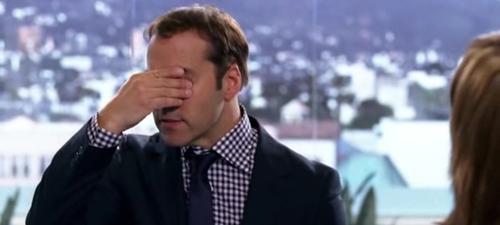"Like the reader of Milton’s Paradise Lost who sympathizes with Satan, only to be reminded of his own fallen nature, the viewer is implicated in Ari’s shaming. Up until this point, his bravado has seemed a mask for a family man trying to succeed in a cut-throat industry, but at the end of season seven, he is finally revealed as a bladder of bile kept animate through unadulterated aggression. His true face is the lie, and the viewers fell for it too."
I gave up watching Entourage about the same time I gave up flipping through Maxim magazine at newsstands. Even though they both appealed to part of me, it was a dark sad part that I knew I had to grow out of, or risk being stuck in perpetual adolescence. But last summer, my brother was watching the seventh season a lot and I decided that as long as I didn’t really want to watch Entourage, it would be okay to watch it a little bit. But then something strange happened: Instead of the traditional formula, the show in its final full season (a closing half-season premieres Sunday) seemed to have reversed itself. The two central characters: actor Vincent Chase (the puppy-eyed Adrian Grenier) and his agent Ari Gold (Jeremy Piven) have collapsed in such a way as to call the first six seasons and the show's whole structure into question.
The logic of Ari Gold has always been that power goes stale if not exercised. His screaming tirades and neologistic profanity were always practice in the maintenance of authority. There are bumps along the road, but the show has stayed consistent: he yells and he wins. The trigger for Ari’s crisis is the public release of tapes of him, well, being himself. Recordings of Ari screaming at inferiors, associates, and enemies – which is how he conducts his business – cause a scandal. His fall seems near complete in the last episode: he is (due to his own arrogance) cut out of a deal to bring an NFL team back to Los Angeles, he fails miserably in any attempt to change his behavior even when it’s no longer strategic, and his nameless wife makes good on her threats and leaves him. Ari may not have hit rock-bottom yet (there’s still a concluding half-season), but in non-monetary terms, he doesn’t have much further to go.
There’s something self-flagellating in Ari’s collapse; Piven’s foul-mouthed scrappiness has carried the show for years, but it is uncovered in the seventh season as what it always has been: harassment and abuse. While yelling at his wife’s sister, Ari threatens to hit her with a frying pan. His wife responds, “What’re you gonna do? You gonna call her a whore? Bully some more women? . . . Fuck you.” That’s not a line from Entourage, it’s a well-aimed critique of the show’s first six seasons! The series’s plot has long been a loose shell for Ari’s profanity, Vince’s eyes, and shots of shiny expensive things, which makes it all the more interesting that the method of Ari’s downfall should be the public release of tapes of him at business as usual. The show itself is a tape of Ari abusing people, it's as if the characters saw an episode and revolted. The end of the seventh season reads as an apologia for the misogynist and homophobic invective that dominated the show’s first six seasons. Like the reader of Milton’s Paradise Lost who sympathizes with Satan, only to be reminded of his own fallen nature, the viewer is implicated in Ari’s shaming. Up until this point, his bravado has seemed a mask for a family man trying to succeed in a cut-throat industry, but at the end of season seven he is finally revealed as a bladder of bile kept animate through unadulterated aggression. His true face is the lie, and the viewers fell for it too.
Meanwhile, Vince is losing his sheen as well. In the wake of a stunt accident, he has started living extreme: jumping out of a plane, ditching meetings, and snorting a whole bunch of blow. He has become a red-eyed shadow of his former self, passionless and alone, fraying at the edges. His latest project is a nondescript superhero flick called “Airwalker,” a pointed title for a character who no longer walks on air. A few too many cocaine and porn star rumors have banged up Vince’s public image and he has to meet with directors and studio execs to ensure them he can still play the part, even though it’s clear he no longer can. Adult film actress (and bonafide porn star) Sasha Grey plays a simulation of herself, Vince’s girlfriend, and the angel of death, all at the same time. He falls “in love” with her, but can’t possibly keep up; she is more than alive and he less than. When Sasha is cast in a gang-bang film, Vince panics. She represents an untenable reversal of the show’s traditional many-women-few-men sexual formula that has been the centerpiece of the its wildly successful dudely wish-fulfillment strategy.
The show’s first six seasons have many shots like this one from the second season:

Women without faces or clothes (but with plenty of taut skin), and lots of them. Much of the show’s appeal comes from revealing to middle school boys that there are more beautiful women-shapes living in Los Angeles than they previously thought existed in the world. But Sasha Grey is not that kind of girl.

The cover-shoot for Sasha’s movie is too much for Vince to handle. All those faceless male bodies and sculpted muscles constitute a giant fucking machine; their hairless, sterile flesh is as efficient as it is hollow. When Vince tells Sasha that what she does makes him sick, she tells him that “guys like you, that wanna fuck all sorts of girls just for the fun of it usually make me sick too.” The female version of this bodily apparatus is no less sleek, no less sterile and, no less empty. “Guys like you” was the show’s premise, and its success has demonstrated that guys who dream of rows of violently objectified female bodies will watch stories about a guy who plausibly has that kind of access. But he makes Grey (earlier constructed as the perfect girl who likes sex, partying, and even literature) sick. The kind of woman the implied viewers of Entourage want, when she ceases to be completely imaginary, doesn’t want the kind of guy who watches Entourage. Sasha refuses to quit her movie and Vince gives her an ultimatum: leave the set, or we’re done. She picks performed emptiness over the real thing without even thinking.
There will be a half-dozen more episodes of the show, and I don’t know where the writers will take it from here. Maybe there will be some saving grace for Ari and Vince, but it certainly doesn’t look like they’ll bounce back like they have from other disaster-filled season finales. Season seven ends with self-renunciation, an auto-critique that cuts so deep, it could be fatal. Entourage could end not with redemption for its main characters, but rather for the show itself.
